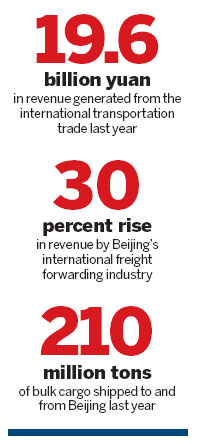

In 120,000 square meters of warehouse space in Fengtai district, a daily average of 56 million tons of goods awaits shipment by Sinotrans Beijing Overland Transportation Corp.
The cargo is ready for shipment directly over international railways to international ports including Manzhouli in northeastern Heilongjiang province and Shenzhen in southern Guangdong province, then on to Central Asia, Russia and Europe, as well as Hong Kong and Macao.
The buzzing warehouse is a snapshot of Beijing's booming transport trade.
Despite the sluggish world economy last year, revenues in the nation's capital from the international transportation trade increased almost 10.9 percent to $19.6 billion, accounting for nearly 16 percent of the country's total.
Without seaports, the modern transport network uses airports, rail stations and highways to facilitate trade to and from the city.
Transportation companies shipped 210 million tons of bulk cargo and more than 11 million containers from or to Beijing last year.
Beijing's international freight forwarding industry has maintained 30 percent average annual growth in both revenue and foreign trade over the past two years.
"While our two major warehouses could generate just 5,000 yuan ($789) to 6,000 yuan in annual revenue two years ago, both now have a business scale of around 100 million yuan," Li Jianhua, assistant manager of Sinotrans Ltd's Beijing branch, told local media.
"In the past, what we dealt with were mainly light industrial products, which are large in volume but low in value," said Li Rong, general-secretary of the Beijing International Freight Forwarders Association.
"Now the majority are electronics and medicines, small in size yet high in value," Li said, adding that foreign trade by air accounts for 20 to 23 percent of the city's total.
The transport trade has also spurred development of related industries like tourism, dining and exhibitions.
In addition, other service sectors such as finance, IT and education are also flourishing in the city.
Beijing's service trade generated more than 1.2 trillion yuan in revenue last year. The service industry contributed 75.7 percent of the city's GDP.
The service trade is expected to surpass $120 billion in 2015, according to the Beijing Municipal Commission of Commerce.
zhuanti@chinadaily.com.cn
(China Daily 05/25/2012 page20)